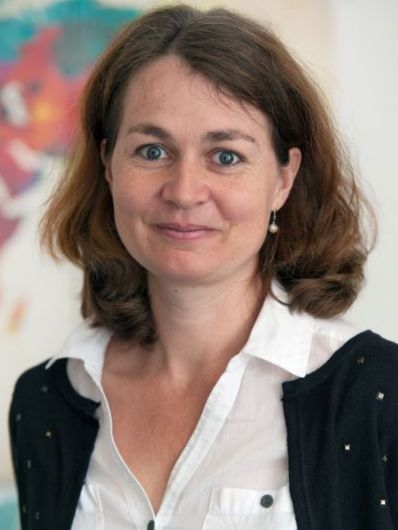- GU Home
- Faculties
- Social & Cultural Anthropology
- People
- Fehlings, Susanne
PD Dr. Susanne Fehlings

Substitute Professorship
Email: Fehlings (at) em.uni-frankfurt.de
Office hours: registration per Email
Room: 555
Tel.: 069/ 798 33072
Region: Eastern Europe, Black Sea Resgion (Crimea, South Caucasus), Central Asia; Global China, Silk Road Countries;
Thematic focus: Urban Anthropology, Social- and Economic Anthropology, Anthropology of the State, Bureaucracy, Anthropology and Science Fiction, Memory Studies.
Contact person for the area "The Caucasus"
Politically, the Caucasus comprises parts of the Russian Federation in the north and the independent post-Soviet republics of Armenia, Azerbaijan and Georgia (South Caucasus) in the south. Geographically, this area is situated between the Black and Caspian Seas. It is characterised by coastal zones and mountain ranges and includes arid deserts and steppes, as well as temperate-continental and subtropical-humid areas. The population is heterogeneous. In addition to the so-called "titular nations", ethnic groups from whose ethnonym the names of the nation-states are derived – Armenians, Azeri and Georgians, one also finds other ethnic and religious minorities such as Juhuro ("mountain Jews"), Molokans, Yazidis, Assyrians, and Kurds. On the one hand, from an internal and external perspective, the Caucasus is imagined as a connecting link between East and West, Asia and Europe and Orient and Occident. On the other hand, as reflected in the writings of Russian and European authors of the 19th century, this area is considered isolated and dangerous. In these novels, one can find romantic descriptions of "wild" mountain peoples and their concepts of honour. Despite all the exaggerations, both ideas are rather justified.
Historically, trade routes and migratory flows connected with the ancient Silk Road ran through the Caucasus. To this day, the Caucasus is a transit zone and brings together a wide variety of people and worldviews. At the same time, the region has been and is ravaged by conflicts and wars that can be traced back throughout history to changing power relations. Such conflicts continue to threaten social, political and economic security today and shape external contacts. Globally powerful nations such as the USA, Russia, Iran and Turkey, and more recently China, are interested in the natural resources of the Caspian Sea and in the geostrategic location of the Caucasus. At the same time, they consider the region as a periphery that appears foreign to some extent in terms of its cultural values and constellations.
The eventful history of the Caucasus, the ethnic and religious diversity, as well as the social, legal, political, economic and linguistic characteristics make the Caucasus a very interesting area of research for social and cultural anthropologists. However, despite favourable research conditions and support by local researchers and institutions, the Caucasus region remains underrepresented in the anthropological scholarship.
The projects carried out by our researchers, doctoral students and local students in the Caucasus cover a wide range of topics. They range from urban anthropology and local economics to religious identities and reproductive technologies. In addition to research contacts, our institute also cooperates with local universities that provide student exchange and support for student research projects.
Yerevan State University, Armenia
Ivane Javakhishvili Tbilisi State University, Georgia
Current Academic Position/Projects
Leader of the Volkswagen Foundation funded research project: „Informal Markets and Trade in Central Asia and the Caucasus“; Researcher at the Frobenius Institut for Research in Cultural Anthropology at the Goethe-University Frankfurt am Main; Fellow of the Johanna Quandt Young Academy at the Goethe-Universität Frankfurt am Main
Projects
The Immediate Consequences—and Projected Long-Term Impact—of the Corona Crisis on Informal Markets and Trade in Eurasia
06/2021-05/2022.
Informal Markets and Trade in Central Asia and the Caucasus.
06/2016-05/2020.
Education
| 2021-2023 | Fellow of the Johanna Quandt Young Academy at Goethe University Frankfurt am Main |
| Nov. 2020 | Habilitation at the Goethe-University, Frankfurt am Main, Faculty of Philosophy and History; Venia Legendi for Anthropology; Title: „Traders, Informal Trade and Markets between the Caucasus and China" |
| April 2014 | PhD in Social and Cultural Anthropology at the Eberhard Karls University, Tübingen; (Review: magna cum laude, Defensio and Disputatio: summa cum laude); Thesis title: „Jerewan: Urbanes Chaos und soziale Ordnung“ |
| 2009–2013 | PhD Program at the Department of Social and Cultural Anthropology, Eberhard Karls University, Tübingen |
| 2001–2007 | Master (Magister) of Art at the Departmen of Social and Cultural Anthropology, Eberhard Karls University, Tübingen; Thesis title: “Ruhestätten in bester Lage: Räumliche Ordnungen sozialer Werte auf Friedhöfen in Simferopol/Krim“ |
| 2004–2005 | Studies in Anthropology and Russian Studies at the Faculty of History of the Lomonosow University, Moscow (MGU) |
| 2000–2001 | Studies in Archaeology and Art History at the Université de Paris – Sorbonne, Paris IV |
- Studying at Goethe University
- International applicants
- Faculties
- Overview of study programmes
- Programme for refugees
- GRADE
- Goethe Business School (continuing education)
- Research at Goethe University
- Scientific news
- Goethe Welcome Center (for international researchers)
- Collaborative research projects
- Individual research
- Visiting fellowships
- Endowed chairs
- About the University
- News-in-brief
- University administration
- Campus locations
- Campus life
- University archives (German)
- Rhine-Main-Universities





